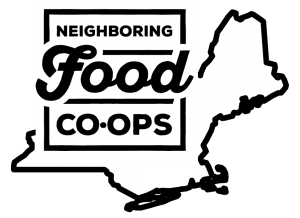 Your Neighboring Food Co-ops
Your Neighboring Food Co-ops
Locally Owned by More Than
160,000 People Like You!
In this Month’s E-News, check out:
- Collective Resilience in Crisis
- Pride: Everyone is Welcome at Your Neighboring Co-op!
- CUNA Mutual Group: Partnership for Collective Purpose
- Remembering Johnston Birchall
- June’s Cave to Co-op Special
- Farmers Union: Food Hubs & Food Safety
- Co-op Calendar
Collective Resilience in Crisis
As we celebrate 10 years, our resilience and shared impact shines through at a time of crisis, pointing the way toward a better future.
By Alexis Alexander, NFCA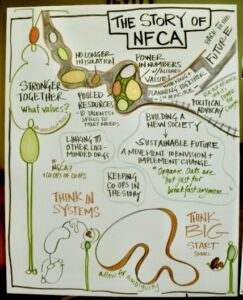
Suffice it to say, 2020 was a year like no other. Food co-ops throughout the country faced unprecedented challenges arising from the COVID-19 pandemic. From keeping our shelves stocked to ensuring the safety of our staff, member-owners and shoppers, our co-ops were tirelessly and creatively adopting new practices and forming new partnerships to keep our co-ops running and effectively serve our communities in an ever-changing landscape. The sheer resilience of our co-ops in meeting the many challenges was impressive in itself, and also an important testament to the power of our shared co-operative principles and values and the core belief of co-ops being stronger together.
Every year, the Neighboring Food Co-op Association (NFCA) surveys our member co-ops across the Northeast to better understand our shared impact and progress toward our vision for a co-operative economy rooted in a more healthy, just and sustainable food system. In 2020, 94% of respondents agreed with the statement that the success of their individual coop is supported by the shared success of other co-ops in the region. To that end, NFCA staff and member co-ops worked collaboratively to share information, learnings, strategies, and resources to help each other through the crisis. To better serve our member co-ops, NFCA staff made instrumental changes in its programming. For example, NFCA’s annual Peer Trainings turned into quarterly conference calls for departments particularly challenged during the pandemic, new listservs were created, online workshops were offered, and policy advocacy work was undertaken in collaboration with the National Cooperative Business Association to help ensure that food co-ops could access crucial government support such as the Small Business Administration (SBA) Paycheck Protection Program (PPP) and Economic Injury and Disaster Loans (EIDL).
At year’s end, the efforts of our work together paid off. In a year of crisis, our Annual Food Co-op Impact survey revealed that the collective impact of our 42 member co-ops and startups was stronger than ever. With annual revenue of over $382 million, the average growth of our existing co-ops was 7%, compared to just 1% the year before. In fact, most key measures were up compared to 2019. For example:
- Total Membership increased by 8% to over 164,000 co-op members;
- Annual Revenue grew an impressive 10%, from $346 million to $382 million;
- Despite the pandemic and rampant job loss across the country, our co-ops provided 2,460 local jobs, up 4%; and
- Local product sales showed a strong 8% increase to more than $100 million dollars in total, contributing substantially to our local farming and business communities.
In this challenging time of isolation, more people rediscovered the important role of our food co-ops as community hubs, with about 12,000 new members joining in the last year alone.
These survey measurements are a sampling of those collected that reveal the strength of our collective impact and the positive contributions our co-ops make in keeping their local communities stronger. In our upcoming newsletter issues, we’ll continue to share survey results and show how we are working together to create more healthy, inclusive and equitable work environments and communities, and explore future opportunities for our collective action.
Pride: Everyone is Welcome at Your Neighboring Co-op!

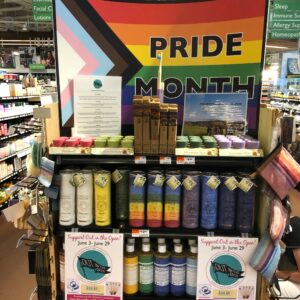
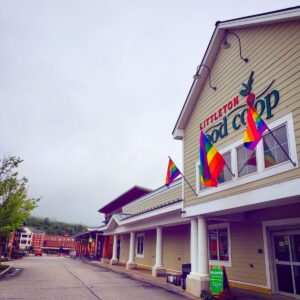
CUNA Mutual Group: Partnership for Collective Purpose
A Partnership Rooted in Our Collective Purpose!
CUNA Mutual Group, a financial cooperative, was established in 1935 as part of the credit union movement. While a lot has changed in the past 85 years, we’ve stayed true to our roots and our fundamental belief that a brighter financial future should be accessible to everyone. Founded on the credit union principle of “people helping people,” we embrace “cooperation among cooperatives” and are proud to support the work of the Neighboring Food Co-op Association as you celebrate 10 years of co-operation.
The people we serve in partnership with credit unions work hard for what they have and want to protect their livelihoods, loved ones and communities. We work every day to deliver innovative, reliable solutions and experiences that enable more people in more ways to make financial decisions that work for them. We believe in the cooperative business model.
Customer expectations are changing fast and we’re changing with those expectations. We clearly aren’t the same company we were a few years ago. We’re going through our own transformation to remain relevant to the credit unions and consumers we serve today. We’re looking to the future and embracing innovation and disruption. Technology will continue to transform how consumers interact with businesses and we’re making high-levels of investment in technology and the customer experience.
Today, we have relationships with 95% of credit unions in the U.S., protecting nearly 30 million credit union members through our insurance and investment services. Helping credit unions remain strong is a big priority for us. That’s why we support organizations that contribute to the growth and vitality of credit unions and other cooperatives, providing $147 million to the movement over the last 5 years.
United on Advocacy
Our commitment to the cooperative business model extends well beyond our products and services. When the advocacy battles heat up, we are there to stand united with credit unions and co-ops. Most recently, we focused our resources and advocacy efforts to preserve the credit union tax exemption in Iowa, Kentucky, Kansas and Illinois. That battle isn’t over yet and we’ll continue to stand united with credit unions on these critically important issues. We are also active members of the National Cooperative Business Association, Cooperative Development Foundation, and the Cooperative Network.
Giving Back Part of our Core
Like credit unions and other cooperatives, giving back to the community is part of who we are. Last year, our employees donated their time, money and expertise, logging more than 15,000 volunteer hours. We also contributed an additional $20 million to our foundation to create a sustainable funding source for many years to come. We want to make a real difference and help close the gap on economic and educational disparities in our communities.
Fostering a Diverse, Equitable and Inclusive Culture
We believe greatness can come from anywhere and anyone and we’re building an environment where everyone feels included. Our 12 engagement resource groups are driving greater awareness around how our unique and diverse backgrounds build a stronger and more innovative organization.
We’re excited about the future. We believe CUNA Mutual Group will continue to be the partner credit unions and co-ops count on to help them grow in new ways and to build deeper member relationships.
We’ll be there to make a difference in the lives of members, in partnership with credit unions.
We’re getting better and better at anticipating and responding to members’ needs by delivering insight, products and services that exceed expectations. We are here to help credit unions and the cooperative system succeed.
Professor Johnston Birchall, a leading author, scholar and thought-leader for co-operation internationally, was a Professor Emeritus at the Social Sciences Department at the University of Stirling.
Leading co-operative scholar Johnston Birchall passed away in June following an extended period of illness. He dedicated over 25 years researching issues related to stakeholder participation in cooperatives, mutual and public service agencies. After studying at Oxford, he did a PhD at the University of York and spent five years as a housing association manager before becoming an academic.
His publications included ‘Building Communities the Co-operative Way’ (1988; Re-issued 2014), ‘Co-op: the People’s Business’ (1994), ‘The International Co-operative Movement’ (1997), ‘People-Centred Businesses: co-operatives, mutuals and the idea of membership’ (2010), and ‘Finance in an Age of Austerity: the power of customer-owned banks’ (2013).
Read more about Birchall and his inspiring career in co-ops: https://www.ica.coop/en/newsroom/news/remembering-professor-johnston-birchall
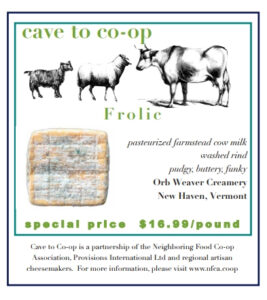
Frolic is a pasteurize, farmstead Jersey cow-milk cheese with a washed rind. The pudgy 1.25 pound square has a peachy colored rind from regular washing. Don’t be put off by the occasional fuzzy white mold, it’s harmless. Frolic might not look pretty on the outside but inside the richness from the Jersey milk shines and balances the slight funk from the rind.
Frolic is a one of the first cheeses that cheesemaker Kate Turcotte created, and is named after a favorite, special cow. Kate along with Zack Munzer have worked with Marjorie Susman and Marian Pollack, the original owners of Orb Weaver farm, to take on the full operation and now produce cheese year round to keep the farm sustainable. Marjorie and Marian worked for over 37 years building their micro-dairy and helped found the farmstead cheesemaking movement in Vermont.
You can read more about Orb Weaver Creamery and find recipes using Frolic as well as past month’s featured cheeses on the June Cave to Co-op page.
Each month our Cave to Co-op partnership between Provisions International and the Neighboring Food Co-op Association (NFCA) offers a delicious regional cheese featured at a great price. Strengthening our local and regional farmers and producers by supporting artisanal cheesemakers is a key goal of the Cave to Co-op program.
Farmers Union: Food Hubs & Food Safety
By Billy Mitchell, NFU Food Safety Training Coordinator, & Tricia Wancko, NFU Food Safety Grant Coordinator
“I’m really passionate about helping to make the local food movement in Alabama successful, and I feel like that is only going to happen if we are extremely creative and cooperative,” explained Farm Food Collaborative Co-Manager Carey Martin-Lane at a recent “Farm to Food Opportunity: Growing Community Value Through Food Hub Operations” workshop. Geared towards local food producers, the workshop was hosted by the Alabama Cooperative Extension System with support from the West Georgia Farmers Cooperative, the Alabama Department of Agriculture and the Local Food Safety Collaborative, and offered a chance for presenters and participants to share stories and best practices of running an efficient operation while managing both financial and food safety risks. The Farm Food Collaborative, which is North Alabama’s first local food hub and operates out of the Food Bank of North Alabama, works alongside growers to find innovative ways to get their products and produce out into the world. Part of this work focuses on encouraging farmers to keep records and run lean and flexible operations to help maximize their sometimes-limited resources—all to help farmers get their food out to as many people as possible.
successful, and I feel like that is only going to happen if we are extremely creative and cooperative,” explained Farm Food Collaborative Co-Manager Carey Martin-Lane at a recent “Farm to Food Opportunity: Growing Community Value Through Food Hub Operations” workshop. Geared towards local food producers, the workshop was hosted by the Alabama Cooperative Extension System with support from the West Georgia Farmers Cooperative, the Alabama Department of Agriculture and the Local Food Safety Collaborative, and offered a chance for presenters and participants to share stories and best practices of running an efficient operation while managing both financial and food safety risks. The Farm Food Collaborative, which is North Alabama’s first local food hub and operates out of the Food Bank of North Alabama, works alongside growers to find innovative ways to get their products and produce out into the world. Part of this work focuses on encouraging farmers to keep records and run lean and flexible operations to help maximize their sometimes-limited resources—all to help farmers get their food out to as many people as possible.
During the workshop, Martin-Lane not only covered these concepts, but also answered questions from both an in-person audience and those attending virtually via Facebook Live about the collaborative’s experiences working with growers. Each year, the Farm Food Collaborative surveys its farmers to find areas where they might need help; recently, there has been a call for one-on-one food safety technical assistance. As growers have developed relationships with lots of different buyers, being able to meet a variety of food safety expectations and requirements has become ever more important. The Farm Food Collaborative provides supports farmers as they navigate the ins and outs of food safety practices, compliance with the FSMA Produce Safety Rule, and third-party audits. While meeting these different expectations and requirements could cause confusion and friction among collaborative members, Martin-Lane has been continuously impressed by their ability to navigate the challenge as a group. “Our farmers work together super well. It never ceases to amaze me how our farmers have figured out how to work together.”
Martin-Lane knows that “farmers got into farming to farm, not to do paperwork.” With food safety certification, growers found that some records can make a big difference. While the process of starting to document food safety practices can be time consuming and even a little frustrating, the added benefits beyond lowering food safety risks soon become clear. One farmer realized that record keeping saved them money—“significant money.”
As interest in farmers working co-operatively continues to grow, so does the desire to find solutions to reduce risk and increase the availability of their products in local markets.
To learn more about co-operatives, tune into National Farmers Union’s The Evolution of the Co-operative Identity webinar on June 22, 2021, at 2:00 PM EST. More information on the Farm Food Collaborative—including opportunities to volunteer with the Food Bank—can be found here. For food safety resources, please visit the Local Food Safety Collaborative website along with the Food Safety Resource Clearinghouse for a curated source of food safety guides, factsheets, templates, and more. Don’t forget to follow us on Facebook and Twitter for updates on the latest food safety news.
Roger Noonan, President, New England Farmers Union, and organic farmer will be presenting a workshop, Update on Food Safety Rules for Small Producers & Co-ops, at the NOFA Summer Conference held online July 30-Aug 6th. Registration and more information here.
This project website is supported by the Food and Drug Administration (FDA) of the U.S. Department of Health and Human Services (HHS) as part of a financial assistance award 1U01FD006921-01 totaling $1,000,000 with 100 percent funded by FDA/HHS. The contents are those of the author(s) and do not necessarily represent the official views of, nor an endorsement, by FDA/HHS, or the U.S. Government.
For More Co-op Events, Visit https://nfca.coop/calendar
The Neighboring Food Co-op Association (NFCA) is a co-operative federation of over 40 food co-ops and startup initiatives across New England, working together toward a shared vision of a thriving co-operative economy, rooted in a healthy, just, and sustainable food system and a vibrant community of co-operative enterprise.



